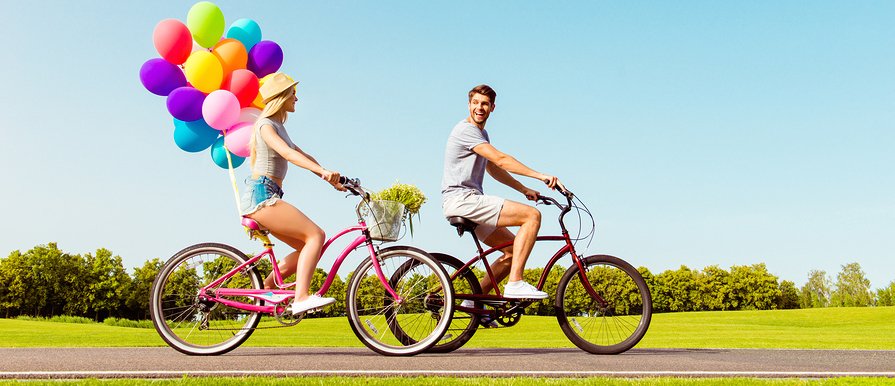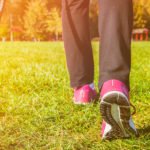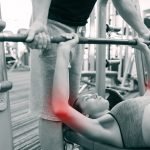Now that the temperatures are warming, it’s the perfect season to get outside more frequently. One of the best ways to take advantage of spring’s bounty while also keeping in shape is to hop on your bicycle and take a spin around the neighborhood. And there’s no better time than the present to get going, especially since May is Bike Month, 31 days dedicated to motivating you to pedal your way to better health.
Even if you haven’t ridden a bike in years, it’s not hard to resume this all-around wonderful habit. Remember back to your childhood and how great it felt to get those pedals going and feel the wind in your hair? You can still get a similar thrill now as an adult on your bike, as well as receive lots of great benefits.
Read on for seven good reasons why you don’t want to miss out on Bike Month.
Biking Promotes Better Sleep
A good night’s sleep is essential to your overall health and mental wellbeing, and cycling can provide a positive effect on our slumber. In fact, a 2010 study at Northwestern University in Chicago, Illinois found that people with chronic insomnia who started doing aerobic exercise such as biking for 40 minutes a day, four times a week, improved both the quality of their sleep and their daytime mood.1 Reid, Kathryn J.; et al. “Aerobic exercise improves self-reported sleep and quality of life in older adults with insomnia.” Sleep Medicine. October 2010. Accessed 19 April 2017. http://www.ncbi.nlm.nih.gov/pmc/articles/PMC2992829/.
Biking to Work Offers a More Enjoyable Commute
Rather than sitting in your car or on a crowded bus or train to get to work, consider riding your bike there. Obviously, this is only practical if you live a reasonable distance from your job; no one is recommending taking on a 40 mile bike ride to work and home each day. But whether you live in a city, the country, or suburbs, commuting on your bicycle can make the experience much more pleasant. It can also create workout time in your busy days, save you money on gas or public transportation fare, and reduce your carbon footprint all in one fell swoop.
Biking Is Good for Your Brain
We know that physical activity is beneficial for keeping our mental processes functioning optimally. Riding a bicycle was shown in a 2015 study at Tzu Chi University in Taiwan to increase brain-derived neurotrophic factor (part of a family of proteins that induce the survival, development, and function of neurons), which helps regulate our memory, stress levels, and overall mood.2 Tsai, S.W.; et al. “Brain-derived neurotrophic factor correlated with muscle strength in subjects undergoing stationary bicycle exercise training.” Journal of Diabetes and its Complications. April 2015. Accessed 19 April 2017. http://www.ncbi.nlm.nih.gov/pubmed/25682570.
Biking and Heart Health
Your body receives tremendous cardiovascular advantages from regular bicycling, and this can give you heart disease protection. Recent research at the University of Southern Denmark found that recreational biking was associated with fewer heart attacks and a 25 percent lower risk of cardiovascular disease.3 Blond, Kim; et al. “Prospective Study of Bicycling and Risk of Coronary Heart Disease in Danish Men and Women.” Circulation. 31 October 2016. Accessed 20 April 2017. http://circ.ahajournals.org/content/134/18/1409.
Biking Benefits Your Breasts
Aerobic workouts can help lower the risk of many types of cancers, and riding a bike in particular has been shown to impact breast cancer risk. A 2014 study at the University of Paris-Sud in France found that women who cycle or take part in another vigorous form of aerobic exercise for two hours a week have a 10 percent lower risk of developing breast cancer than their peers who work out less.4 Fournier, Agnes; et al. “Recent Recreational Physical Activity and Breast Cancer Risk in Postmenopausal Women in the E3N Cohort.” Cancer Epidemiology, Biomarkers & Prevention. August 2014. Accessed 20 April 2017. http://cebp.aacrjournals.org/content/early/2014/07/31/1055-9965.EPI-14-0150.
Biking Is a Great Group Activity
Trying to think of ways to stay healthy with your significant other, family members, or friends? Look no further than your bicycles. This activity is easy on the joints; you control the pace and length of the ride; and people can do it at almost every age. So the next time friends suggest meeting for lunch (and what will likely involve consumption of a large number of calories), propose an alternative of spending the afternoon on a pretty bike path instead.
Biking Your Way to Longevity
You may be able to not only live a healthier life, but also a longer one, by riding your bicycle regularly. A 2011 study of Tour de France riders showed they lived to 81.5 on average, while the average for the general population is 73.5 for an amazing surplus of eight years.5 Sanchis-Gomar, F.; et al. “Increased average longevity among the “Tour de France” cyclists.” International Journal of Sports Medicine. August 2011. Accessed 20 April 2017. http://www.ncbi.nlm.nih.gov/pubmed/21618162. Never going to be a competitive cyclist? No problem! Other research suggests that even recreational riders may gain up to an extra hour of life for every hour they cycle.
And let me leave you with a quote from the sign at the cycling store which read, “You can’t buy happiness but you can buy a bike and that’s pretty close.”
References
| ↑1 | Reid, Kathryn J.; et al. “Aerobic exercise improves self-reported sleep and quality of life in older adults with insomnia.” Sleep Medicine. October 2010. Accessed 19 April 2017. http://www.ncbi.nlm.nih.gov/pmc/articles/PMC2992829/. |
|---|---|
| ↑2 | Tsai, S.W.; et al. “Brain-derived neurotrophic factor correlated with muscle strength in subjects undergoing stationary bicycle exercise training.” Journal of Diabetes and its Complications. April 2015. Accessed 19 April 2017. http://www.ncbi.nlm.nih.gov/pubmed/25682570. |
| ↑3 | Blond, Kim; et al. “Prospective Study of Bicycling and Risk of Coronary Heart Disease in Danish Men and Women.” Circulation. 31 October 2016. Accessed 20 April 2017. http://circ.ahajournals.org/content/134/18/1409. |
| ↑4 | Fournier, Agnes; et al. “Recent Recreational Physical Activity and Breast Cancer Risk in Postmenopausal Women in the E3N Cohort.” Cancer Epidemiology, Biomarkers & Prevention. August 2014. Accessed 20 April 2017. http://cebp.aacrjournals.org/content/early/2014/07/31/1055-9965.EPI-14-0150. |
| ↑5 | Sanchis-Gomar, F.; et al. “Increased average longevity among the “Tour de France” cyclists.” International Journal of Sports Medicine. August 2011. Accessed 20 April 2017. http://www.ncbi.nlm.nih.gov/pubmed/21618162. |











